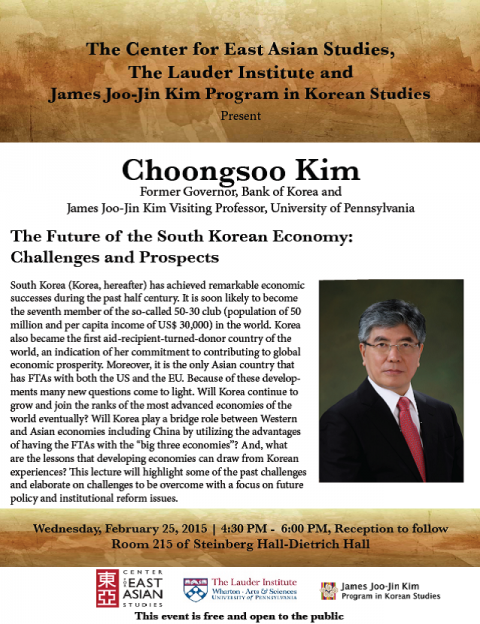
Co-sponsored Event
Steinberg Hall-Dietrich Hall, 215
CEAS-Lauder Distinguished Lecture, co-sponsored by the James Joo-Jin Kim Program in Korean Studies
Choongsoo Kim, Former Governor of the Bank of Korea and James Joo-Jin Kim Visiting Professor, University of Pennsylvania
South Korea (Korea, hereafter) has achieved remarkable economic successes during the past half a Century. It is soon likely to become the seventh member of the so-called 50-30 club (population of 50 million and per capita income of US$ 30,000) in the world, Thanks to “the Han River Miracle,” Korea’s per capita income relative to that of the US increased from 12.5% in 1970 to 62.4% in 2013: that is, while the US per capita income increased by ten-fold, Korea’s per capita income increased by fifty-fold during the same period. On the other hand, Korea became the first aid-recipient-turned-donor country of the world, an indication of her commitment to contributing to global economic prosperity. Moreover, Korea is the only Asian country that has FTAs with both the US and the EU. Korea and China already agreed to sign an FTA in November 2013 and it will take effect as soon as it is ratified. Korea will then have FTAs with all the “Big Three” economies of the world.
Now, many questions arise. First, how is it likely that Korea continues to grow and joins the ranks of most advanced economies of the world like G7 eventually? Issues such as expanding the production capacities and undertaking institutional reforms in line with global norms must be explored as ways to enhancing global competitiveness, improving income inequalities, and making the financial markets less crisis-prone. Second, will Korea play a bridge role between Western and Asian economies including China by utilizing the advantages of having the FTAs with the “big three economies”? An issue like strengthening the efforts of global and regional economic cooperation emerges. Third, what are the lessons that developing economies can draw from Korean experiences? Korea should become a “role model” for those countries that attempt to achieve economic growth based upon the principles of market opening and economic liberalization.
The lecture highlights some of the past performances briefly and elaborates challenges to overcome with focus on future policy and institutional reform issues.
 James Joo-Jin Kim Center for Korean Studies
James Joo-Jin Kim Center for Korean Studies